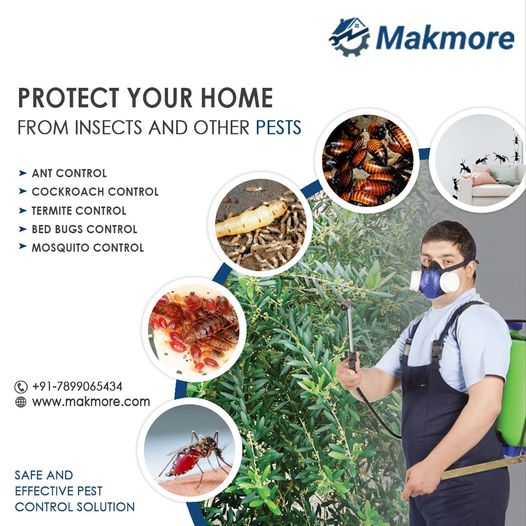Pest Control Auckland: Your Local Experts for Reliable Pest Monitoring
Pest Control Auckland: Your Local Experts for Reliable Pest Monitoring
Blog Article
Comprehending Various Kinds Of Parasite Control Approaches and Their Efficiency
When thinking about pest control techniques, it is essential to comprehend the diverse techniques readily available and their varying levels of effectiveness. By checking out the subtleties of these pest control approaches, an extensive understanding of just how to deal with bug issues can be developed.
Chemical Parasite Control Methods
Chemical bug control approaches play a critical duty in effectively handling and getting rid of pest infestations in different settings. These methods include using chemical compounds to get rid of or discourage parasites such as weeds, pests, and rodents. One of the essential benefits of chemical parasite control is its capacity to provide quick and targeted services to pest issues. By utilizing certain chemicals that are made to target particular bugs, this approach can aid protect against damages to plants, frameworks, and human health.
Nonetheless, it is important to consider the potential threats and downsides connected with chemical bug control techniques. Overreliance on chemicals can result in the development of chemical resistance in bugs, making them more difficult to control in the future. Additionally, using certain chemicals can have hazardous effects on non-target microorganisms, the atmosphere, and human health otherwise applied correctly.

Organic Insect Control Approaches
Using all-natural killers and pathogens to handle pest populaces effectively, biological parasite control methods use a sustainable and eco-friendly method to pest monitoring. By promoting the activity or presenting of organisms that naturally prey on or infect parasites, such as ladybugs for aphid control or specific microorganisms for caterpillar infestations, biological control can aid maintain bug populaces at manageable levels without the requirement for artificial chemicals. This method is specifically advantageous for chemical-free farming methods, as it stays clear of making use of potentially unsafe substances while preserving plant health.

Physical Insect Control Techniques
While biological pest control methods concentrate on using all-natural killers and microorganisms, physical insect control methods utilize mechanical and physical obstacles to handle insect populations. These methods are often taken into consideration eco-friendly as they reduce the use of chemicals. Physical parasite control consists of techniques such as capturing, making use of barriers like webs or displays, and physically getting rid of bugs from the area.
Traps are typically made use of in physical pest control to capture and eliminate bugs like rats and pests. Another physical method is the use of barriers such as fences, screens, or internet to protect against pests from entering or infesting certain areas.
All-natural Pest Control Methods
Incorporating plant-based repellents and natural predators is an essential technique in executing efficient natural bug control techniques. By motivating the existence of beneficial pests like ladybugs, lacewings, or aggressive mites, gardeners can naturally regulate pest populaces. These killers feed upon common garden pests such as aphids, termites, and caterpillars, helping to maintain a well balanced ecological community without the demand for chemical interventions.

In addition, carrying out cultural methods such as crop turning, companion planting, and keeping appropriate plant wellness can likewise enhance the efficiency of all-natural bug control methods. These methods not only aid in stopping pest problems but additionally promote biodiversity and total community strength. By integrating these natural approaches, individuals can properly manage bugs while reducing ecological influence.
Integrated Pest Administration (IPM) Strategy
Executing an Integrated Bug Management (IPM) click for more info strategy is essential for properly regulating insect populaces while decreasing reliance on chemical pesticides. IPM is a extensive and lasting method that incorporates various insect control techniques to accomplish lasting remedies. This approach focuses on control, prevention, and tracking to attend to bug concerns in an eco-friendly fashion.
IPM incorporates biological, social, physical, and mechanical strategies with the strategic and limited usage of chemicals when essential. By stressing aggressive actions such as environment adjustment, biological control, and exclusion, IPM aims to reduce pest populaces and their influence on the ecological community. Normal surveillance is critical in IPM to examine bug levels accurately and determine one of the most proper control techniques.
One of the vital benefits of IPM is its capability to minimize the threats linked with extreme pesticide use, such as ecological contamination and damage to non-target organisms. Additionally, IPM advertises a much more alternative method to pest monitoring by taking into consideration the general ecosystem characteristics. Generally, the IPM strategy offers a sustainable and effective option for bug control while advertising environmental duty.
Final Thought
In final thought, recognizing the various kinds of pest control techniques and their efficiency is crucial in efficiently handling bug infestations. Integrated Insect Administration (IPM) strategy, which incorporates numerous approaches for lasting pest control, is increasingly being recognized as a alternative and ecologically friendly service.
Chemical bug control approaches play a pivotal role in effectively managing and eradicating pest infestations click now in various settings.Making use of all-natural killers and microorganisms to manage pest populations properly, organic bug control techniques provide a eco-friendly and lasting technique to pest administration. By advertising the activity or presenting of microorganisms that naturally prey on or contaminate parasites, such as ladybugs for aphid control or specific bacteria for caterpillar problems, organic control can help maintain insect populaces at workable degrees without the requirement for synthetic chemicals.While organic insect control methods concentrate on utilizing natural killers and pathogens, physical parasite control techniques make use of physical and mechanical barriers to take care of insect populaces. Integrated Bug Management (IPM) strategy, which integrates numerous techniques for lasting insect control, is increasingly being identified as a alternative and eco friendly service.
Report this page